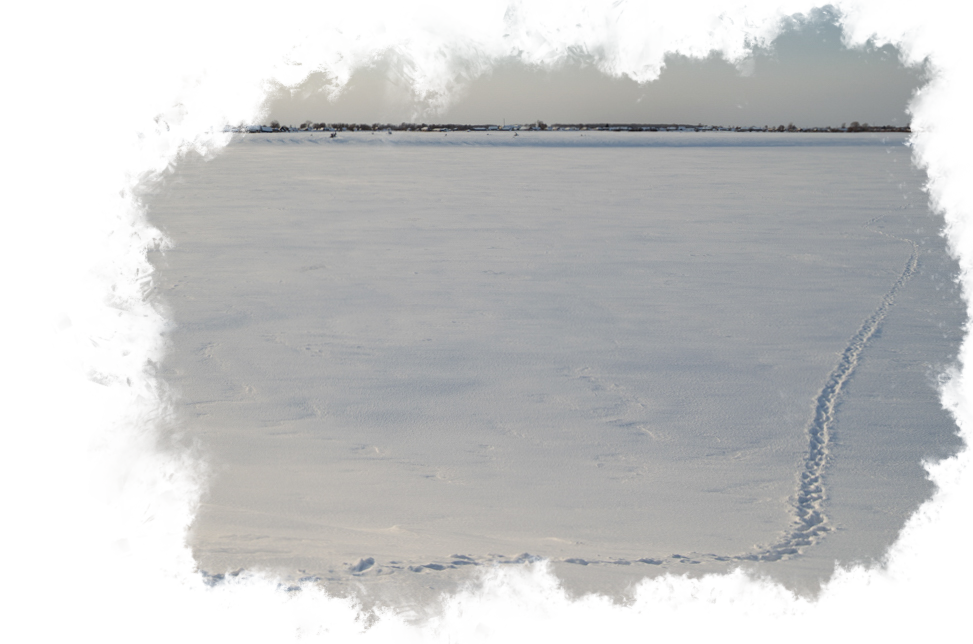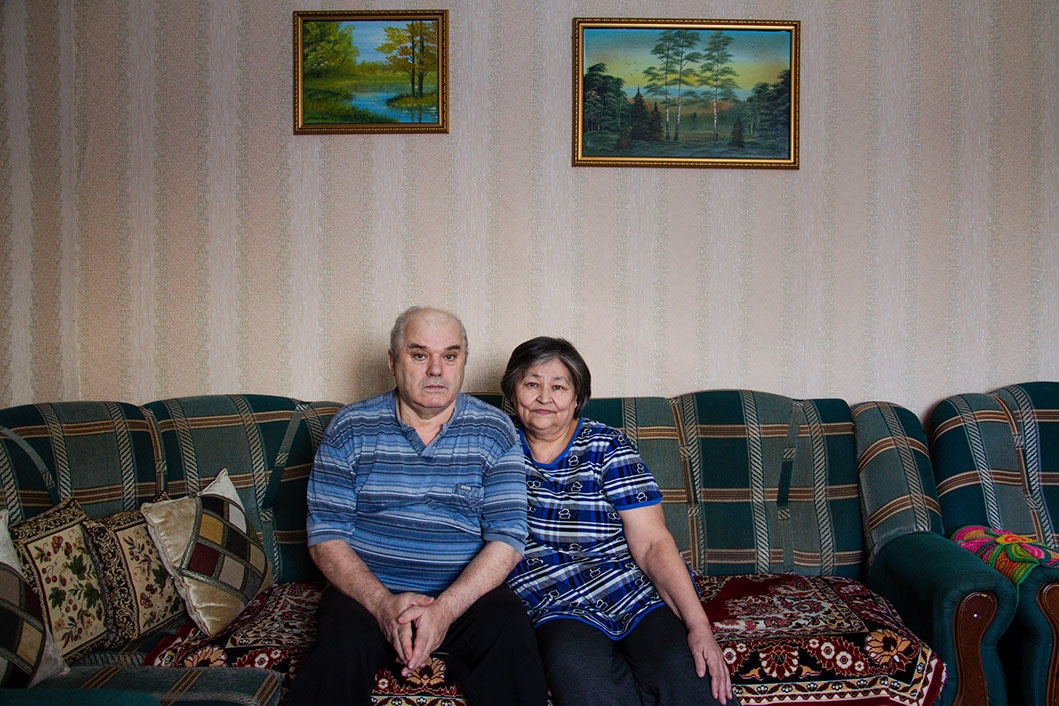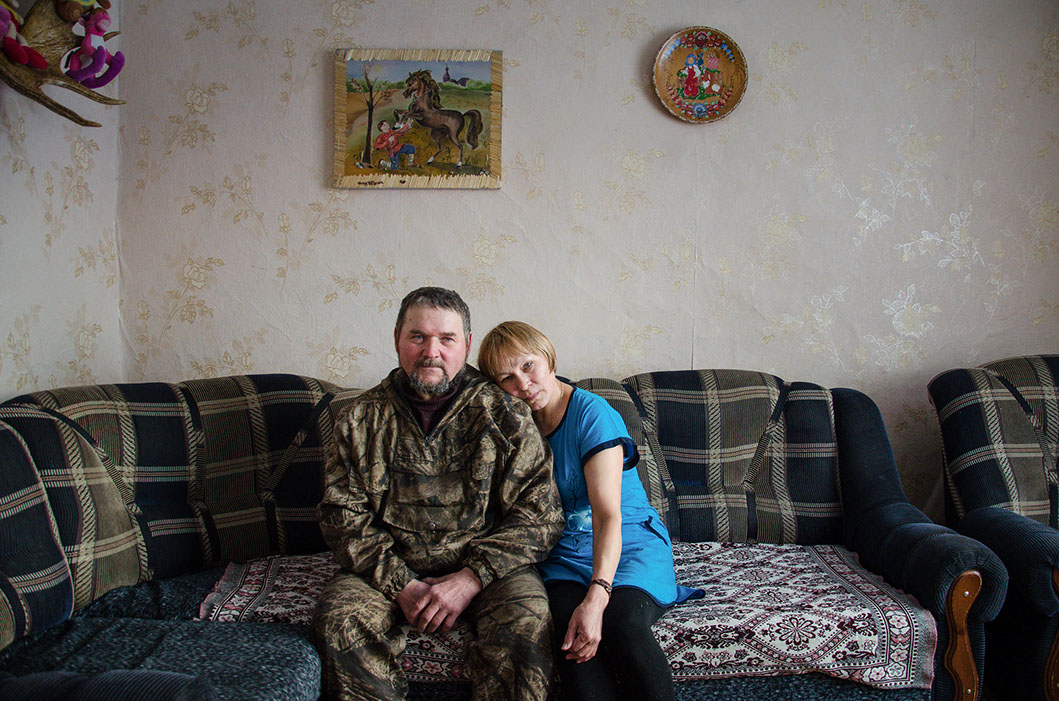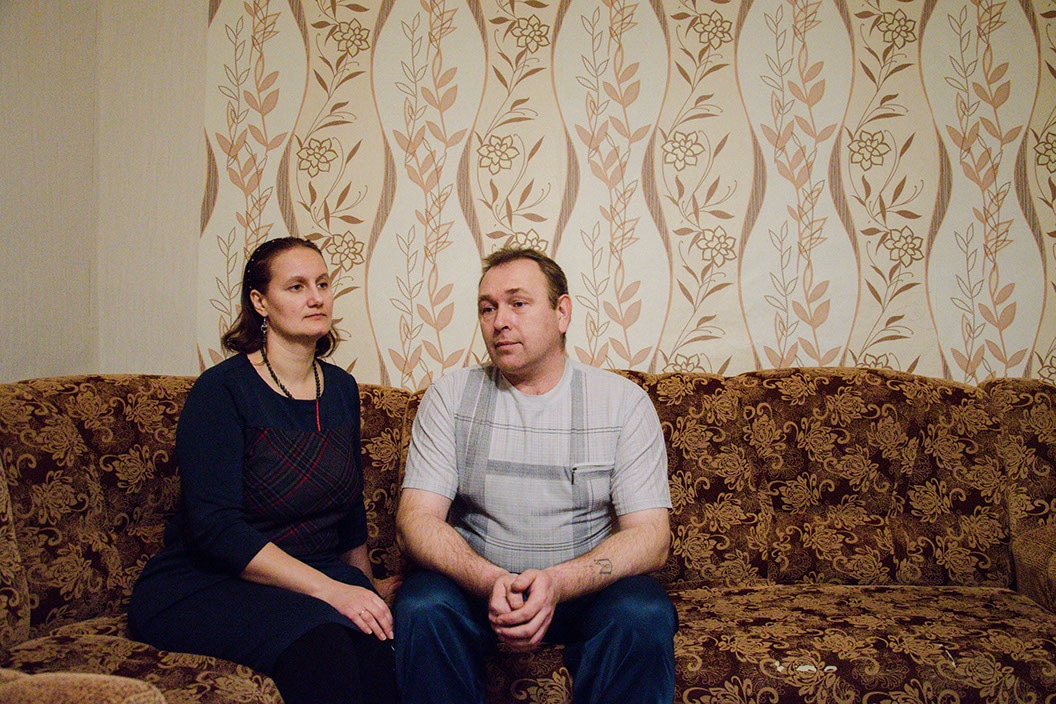
The Three Branches of the Selkup culture
en
The Selkups:
save as...
About
the Project
CONTEXT
TRADITIONS
TROUBLES
How traditions linger in families
with Selkup roots
n the village of Parabel, there are just two Selkup families left whose members know their Selkup roots and they still go fishing and hunting in the same manner their ancestors did many years ago. The majority of Parabel' families are mixed, and it makes it harder for them to follow the Selkup customs; often and often they think there is no sense in it though. Having spoken with the families that preserved traditions partly, we worked out three possible scenarios.
text:
Yulia Kochergina
photo:
Margarita Volokovykh
I
My father-in-law
taught me everything

Victor Fraynd and Nina Fraynd.
The first family that we are going to visit is the Fraynds: Viktor Aleksandrovich and Nina Efimovna. Nina Efimovna, a smiling old woman and the host of the house, opens us the door of the Fraynd's home. She speaks slowly making long pauses before saying a word; we enter the living room in a slow manner of her speaking. As we walk into the room, I notice an embroidered painting on the wall, which spreads from a wardrobe to another wall and turns out to be her daughter’s handmade work. We settle ourselves in the armchairs next to the window. Near the armchairs, there is a coffee table, where a blood pressure meter is kept. During our conversation, Nina Efimovna flannels it constantly.
— Both my parents were Selkup, — she says, — Since the fifth form, I studied in the boarding school for the small-numbered indigenous peoples of the North in the village of Laskino. There were old ABC books in Selkup, though in fact, nobody even opened them as it wasn't interesting for us. However, I had a special copybook where I wrote down pronunciation, translation; I even started learning how to build up sentences. Of course, now I’ve lost that copybook.
Viktor Aleksandrovich, her husband, is a tall man with coarse features: bushy, furrowed eyebrows, long straight nose but rather thin lips. He interrupts his wife politely and specifies our names. Then Nina Efimovna heads to the kitchen to make us some tea and Viktor Aleksandrovich picks a moment to tell us about himself. His father is German who was exiled here from Saratov oblast' in 1942, his mother is local. Victor Aleksandrovich explains that previous German generations tended to marry the Selkups in order to feed themselves.
367,000
so-called
'Soviet
Germans'
were deported to the east during the period of 1941–1942: to the Republic of Komi, the Urals, Kazakhstan, Siberia and Altai. People
had to collect their stuff
and leave their homes
within two days.
Since they are the children of nature, we might have adopted
a lot of their methods
— My father-in-law taught me everything. I remember his telling me about fishing. During ice fishing, wooden sticks are whittled, bent together with a string, and stuck into the solid surface of the lake; then ice is hollowed out. Fish gets into the hole and can't leave it. They also invented fishing near springs. The area where a spring shoots up from the ground is crowded with fish. After putting snow away, the Selkups just take out fish with their bare hands. Since they are the children of nature, we may have adopted a lot of their methods. Formerly, we cooked Selkup dishes such as porsa (Selkup ukha made from dried fish — translator's note), ukha (traditional Russian fish soup — TN), or dried deer meat. Nowadays, hardly do we cook any of these dishes.
Viktor Aleksandrovich tells that the Selkups knew everything concerning nature ranging from the place and time to set the net to the places full
of ducks.
Nowadays, their knowledge just faded into the history. The culture could not be preserved in the written sources because the written language itself did not exist. Ostyak children used to live and study in the boarding school, where they spent all the time except weekends. The Selkup language and history were not taught there. The time that they spent with their parents speaking Selkup was not enough for a new Fraynd generation to be able
to speak it.
Traditions in a neighborly way

Svetlana Chinina and Nikolay Chinin
The family of Chininy greets us in the village of Nel'mach. They welcome us to their warm spacious kitchen where everything is extremely neat and tidy, with a soup cooling on the cooker and the kettle on the Russian stove. At the table, there is a highchair, which Nikolay Ivanovich unties in order to place each of us.
— The majority of the Selkups I know are my maternal relatives. My mother comes from the family of Saispaevs; she is from the village of Saispaevo, — Svetlana Georgievna Chinina tells, — When the government started to exile people there, my family was forced to move to the other bank of the river Nel'mach, where we've been living up to now. Mine and my future husband’s families were friends. He lived at the roots of the mountain and I lived on the top, like in a fairytale. We went fishing and hunting together. My husband taught me to set nets and fish, showed how to haul and use a perch to push nets under the ice during ice fishing. Previously, our whole family used to go fishing together, but the kids have grown up, and they go fishing no longer.
We enter a small study and continue our conversation. There is a sewing machine on the table with some small ribbons lying aside. On the wall, there is a national Selkup costume, a knee length brown dress with colorful stripes along the bottom and sleeves and a furry Selkup sign in the shape of a bear paw on the top part of the sleeves and on the front. On the wall above the table, one can notice a photo taken at The Northern Etudes festival:
— Once I took up a Selkup hobby group. I taught children how to weave nets, seines, and tackles. At first, only my children and other Selkups were coming; however, later everyone, no matter what their nationality was, began to come. We take part in The Northern Etudes, though, to tell the truth, we search the ideas for dances on the internet. My mother told me that the Selkups didn't have their own dances. The costume I made up and sewn myself, by the way.
Now Svetlana Georgievna is proud of her nation as the Selkups have developed a lot, the Selkup culture is talked about, and The Northern Etudes festival gives her a hope that the culture will be preserved for long years. She also mentions that when she studied in the boarding school, nobody ever told them about the Selkup culture, and the Selkups themselves were laughed at. Nikolay Georgevich thinks the Selkup culture will fade away soon as there are too many Russians all around and there are few Selkups who know their customs and language left. However, the Chininy themselves go fishing and hunting as their ancestors did.
«I have already been Russified»

Sergey Tuzakov and Ekaterina Tuzakova
More info
post-selkups.
Post-Selkups: the story
of Tuzakov’s daughter, Lera.
In Parabel', we meet one more Selkup family, Sergey Tusakov and Ekaterina Tusakova. We are warmly welcomed in a flat full of children stuffed toys.
— My father is from the village of Laskino (a village in Parabel' district) from a Selkup family, — Sergey tells us, — But he's never told me anything about it because during the 1970s, people used to hide their real nationality and everybody pretended to be Russian. My grandparents died when I was only a kid. So I was brought up by Russian parents and I've also been russified though. In the 1990s, the process of rehabilitation of nationalities began; nevertheless, I don't consider myself Selkup.
We find ourselves sitting at the table, which is stuffed with goodies of all kinds, and continue our conversation. Ekaterina Nikolaevna doesn't have any Selkup ancestors but she sings in a a Selkup singing ensemble and participates at The Northern Etudes.
— So, it was my mom who got me engaged into the Selkup culture: she organized a singing ensemble and tried to get everybody involved in it. I myself invited my elder daughter, Lena, and we perform together. Now I work in the museum so I have to take part in The Northern Etudes, whether I want it or not. Since childhood, I've been performing on the stage: singing and dancing, and even now I continue working in a creative industry. If it were not for my job, I don't know whether I would become interested in the Selkup culture.
The fact that the Selkup language sounds in songs at The Northern Etudes, even though the songs are made up or translated from Russian, gives Ekaterina Nikolaevna hope that the culture will continue developing. While Sergey Nikolaevich tells us sighing that information gathered by researchers is just kept in books while the bearers of the Selkup culture are dying. The next 15-20 years would pass, and the Selkup culture will completely disappear.